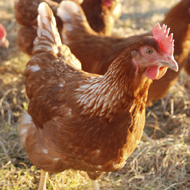First IB QX vaccine announced for UK poultry industry

Full approval for the Poulvac vaccine will make it easier and more effective to tackle specific QX infections without having to apply for an important certificate
The availability in the UK and Ireland of the first specific vaccine against the QX strain of the infectious bronchitis virus has been announced - Poulvac IB QX.
Previously the vaccine, has only been available with a special import certificate for the Veterinary Medicines Directorate for use on flocks where the QX virus has been isolated.
The variant IB strain was first seen in the UK in South-East England in 2007 and has been an increasing problem in European countries over the last 10 years. Since the first sighting, QX has been isolated from a number of commercial layer and broiler flocks, leading to inferior performance and increased mortality.
The vaccine is based in a live attenuated virus and is administered as a coarse spray to broilers from day-old and to layer pullets or broiler breeds from seven days of age. Protection has been demonstrated by challenge study to last 63 days after vaccination.
Often used on the farm, the vaccine can be administered to chicks at the hatchery if adequate controls are in place to avoid spread to other chicks that will be moved to non-QX exposed flocks.
The manufacturers say that full approval for the Poulvac vaccine will make it easier and more effective to tackle specific QX infections without having to apply for an important certificate.



 HMRC has invited feedback to its communications regarding the employment status of locum vets and vet nurses.
HMRC has invited feedback to its communications regarding the employment status of locum vets and vet nurses.